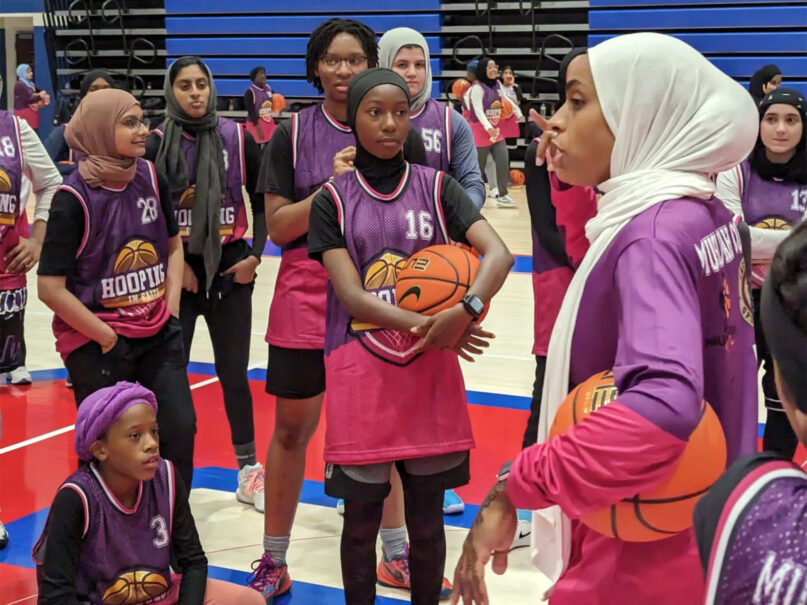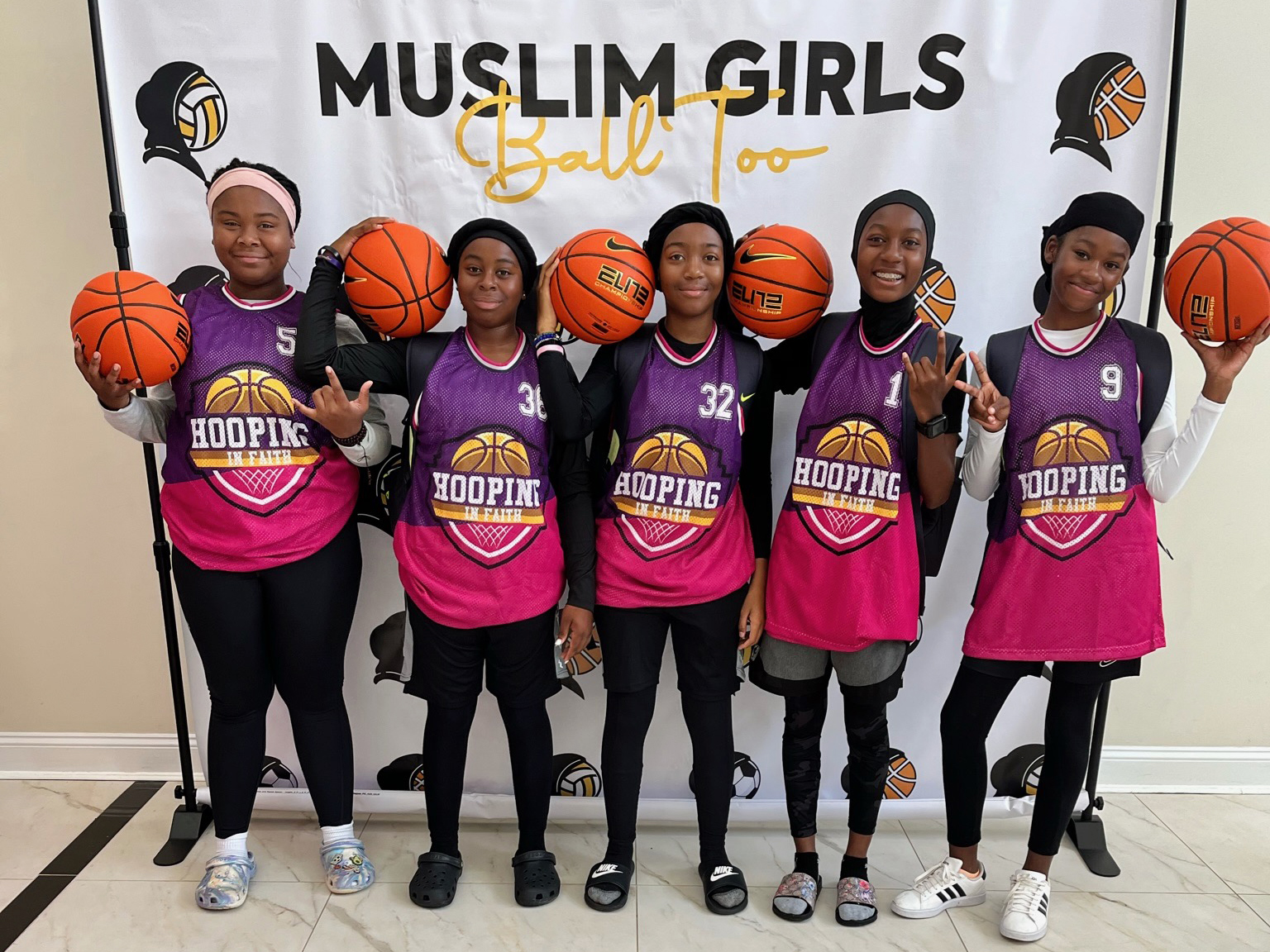MEMPHIS, Tenn. (RNS) — It’s mid-July in Memphis, and 50 girls and young women sporting bright purple and white jerseys are warming up on a basketball court. Though all are Muslim and many cover their arms and legs for modesty, some wear hijab, the traditional head wrap; some do not. All also have the words “Muslimah baller” plastered across the backs of their jerseys.
They have come from across the United States and Canada and as far away as the United Arab Emirates to participate in the inaugural year of a sleepaway camp called Hooping in Faith. Each has come with a burning desire to play basketball and hone skills, but also with a shared goal: to learn under the tutelage of Bilqis Abdul-Qaadir, 32, a former Division I basketball player who didn’t let the barriers to her religious expression keep her from becoming a star.
Abdul-Qaadir first made headlines in 2010 when she was recruited out of Massachusetts by the University of Memphis and became the first woman to play at the top level of college basketball while wearing hijab. Four years later, her dream of playing professionally was initially thwarted when the international basketball association, FIBA, barred her because of her religious dress.
It took more than three years for Abdul-Qaadir’s petition to play with her head covered to succeed, but once she had won, she decided not to play. “I wasn’t in a mental state to be a pro athlete because it comes with so much and I was content with who I was at that moment in time,” she said.
Her victory, however, paved the way for other Muslim women, as well as for Sikh men who wear turbans and Jewish men who wear yarmulkes to play.
“The sport is now in my life in a different way,” said Abdul-Qaadir. “It’s more important now, the way that I’m impacting sports within my community.”
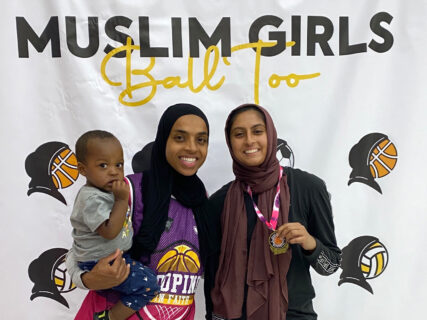
Bilqis Abdul-Qaadir, left, holding her son, and Aruba Asad in July 2023 in Memphis, Tenn. Photo by Liz Kineke
She has continued to push sports to evolve with a nonprofit she founded in 2015, now known as Muslim Girls Ball Too. But Hooping in Faith allows her to share her experience as a Black female Muslim athlete, acting not only as a role model, but a coach, big sister, camp counselor and Sunday school teacher rolled into one.
“The sport has always been a part of our (Black) culture,” she said. “But in the Muslim community I was always the only girl in the mosque playing sports. The foundation of this camp is to provide the things I wish I had when I was a kid.”
Amna Masoud, 23, was a 4-year-old in Brooklyn, New York, when her father put up a basketball net in their backyard. Despite the hours she spent tossing the ball at the hoop, she never learned the rules of the game. “I didn’t even know what a layup was!” she said, laughing. She tried out for the basketball team at her private middle school, and when she didn’t make the cut, she resolved to learn how to play.
About the same time, Masoud began to wear hijab, like her four older sisters and several friends. After her move to public school in ninth grade, though, she was one of the only Muslim girls in her class. “When I would introduce myself to people they had this preconceived notion of who I was based off their own ideologies,” she said. She got used to the stares and double takes in the hallways at school but struggled with her identity. “I definitely had to grow and work through that, to find my confidence while wearing hijab.”
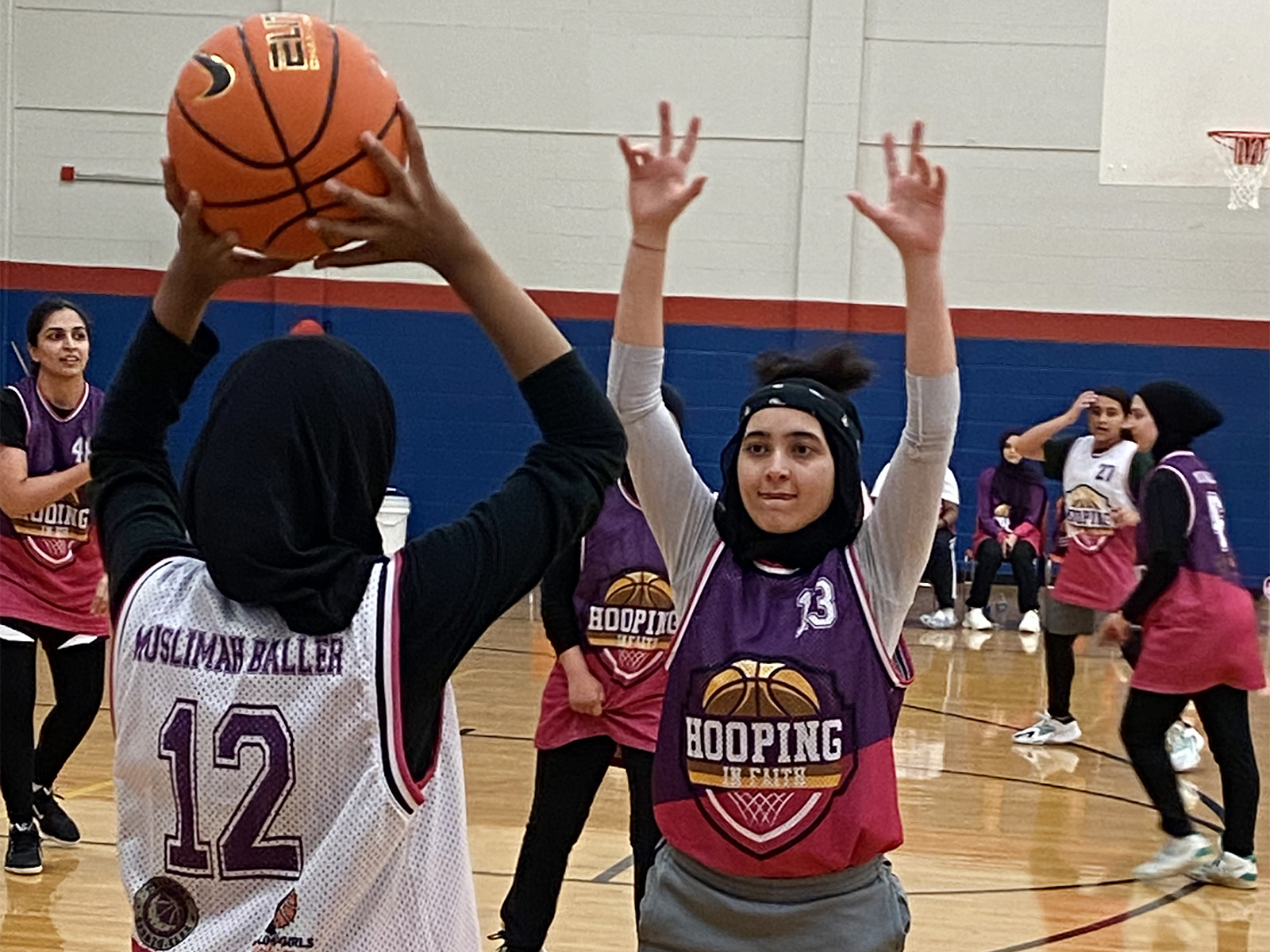
Amna Masoud, right, defends during an inbound play at a Hooping in Faith program in July 2023 in Memphis, Tenn. Photo by Liz Kineke
Basketball helped. When she made the team as a freshman she was thrilled. She became the first woman to wear hijab playing high school basketball in New York City. “Basketball really helped me in finding that pride in wearing it,” she said.
Helping young girls like Masoud is essential to Abdul-Qaadir’s mission. “As Muslim women you can tell we’re different because of our hijab and because of the way we dress,” she said. “We definitely have to be mindful of instilling this kind of self-confidence — that it’s OK to be different.”
The players at Hooping in Faith range in age from 12 to 26, and commingling across generations reinforces a feeling of sisterhood.
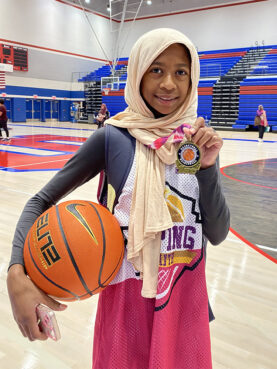
Niya M. poses with a medal at a Hooping in Faith event in July 2023 in Memphis, Tenn. Photo by Liz Kineke
For 12-year-old Niya M., whose mother requested that her last name not be used, being around older girls who play and cover is affirming. One of a handful of Muslim students at her private school in Colorado Springs, Colorado, she started wearing hijab this year and, like Masoud, has found that basketball is helping her overcome her shyness and find her voice. “When I’m playing I can shout without it being weird,” said Niya. “I can be like ‘Get on defense!’ because they know what I’m doing.”
But she admits her presence on the court is a work in progress. “I still say I’m sorry if I bump into someone. I don’t want them thinking that I’m rude,” she explained. She’s excited for her school’s coming basketball season and will likely wear her hijab on the court. “I’m hoping to come back and show off everything I’ve learned,” she said.
India Ali, 36, a lawyer with a practice in DeKalb County, Georgia, also coaches the girl’s basketball team at Mohammed Schools of Atlanta, and she brought eight of her players with her to the camp, sometimes volunteering as a coach. In college, Ali was a point guard for Hofstra University, a Division I school on Long Island, New York. A self-described introvert, she learned to be a better communicator. “As the point guard, I have to yell out the play so we’re all on the same page,” she explained.
“It prepares you for the real world. You’re interacting with so many different personalities but you have to work as a unit. So how do you make that work?”
Players like Ali and Abdul-Qaadir are not only changing American culture; they are changing Muslim American attitudes about sports.
Aruba Asad, 26, who plays in a local league in New York City as she finishes up medical school, sees a shift happening among Southeast Asian parents, who now want their girls to play sports when they previously had not.
“When I was younger, our culture didn’t really push towards that. I feel like we were more academics, academics, academics,” explained Asad, whose Instagram handle is hijabihooper. “Now I’m starting to see the younger generation say, we need our kids to be in things like this as well.” (She also says Hooping in Faith’s 12- to 14-year-olds’ games are far better than any she played at that age.)
Sports, while teaching focus, discipline and leadership, has also long been a catalyst to assimilation and inclusivity. In 2022, Ryan Turell became the first Jewish player to wear his yarmulke in an NBA game. In July, Morocco’s Nouhaila Benzina became the first to wear a hijab in the World Cup.
But change can’t happen fast enough and Abdul-Qaadir understands this better than most. Sacrificing her career in order to make the sport more equitable was difficult. “There are days where I miss basketball. I miss competing. I miss the feeling of making a good play on the court. But your body can’t play forever, right?” she said.
As the camp came to a close this summer, told the players, “This is something that I have dreamt of for years — to see all of you having fun, with nobody telling you that you can’t wear hijab or you’re not good enough.”
The message got through to Khadija Jatta,12, of Memphis, who said that meeting Muslim girls from around the country who love basketball as much as she does is one of the most important parts of camp. “Some people say women can’t play basketball,” she said. “But here you can literally prove them wrong.”
This story has been updated.
